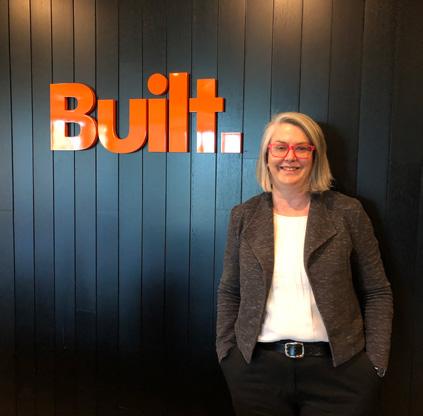
8 minute read
Success BUILT on Incredible Projects, Investment in People and Determination
NADINE O’KEEFFE:
Success Built on Incredible Projects, Investment in People and Determination
WINNUNGA NIMMITYJAH ABORIGINAL HEALTH AND COMMUNITY SERVICES
Nadine O’Keeffe is the General Manager, ACT for construction company Built, and is one of the growing number of female leaders at the company. Established in 1998, Built has grown to be one of the largest, privately owned Australian construction groups, operating throughout Australia as well as New Zealand and the United Kingdom.
Since establishment, Built has continually focused on building a strong culture that bonds their people and drives their business. In support of this culture, the Built Worthy values were established early on and remain the measure and benchmark for everything the Built team does.
Resonating throughout Built, the Built Worthy values are:
> Own the problem
> Be real
> Embrace change
> Think smart, act smart
> Start strong, finish stronger
> Love what you do.
Upon reflecting on the Built Worthy values Nadine mentions, “everything we do every day is changing, particularly in construction and I think it’s important that we do embrace change. Different challenges come up on jobs, and while we may have done things one way yesterday, today we need to think differently.”
When asked about the best advice she’s ever received from someone in the industry, Nadine recalls something her Uncle, a Canberra commercial and residential builder said to her, “Just go for it. Give it a go, give it a crack if it doesn’t work that’s fine, take another tack, but really jump in and have a go.”
Since starting out in the industry 25 years ago as an Architect, Nadine has left her mark on a typically male dominated industry, and she confidently encourages others to follow in her footsteps. “I value collaborating with my teams, developing and supporting people through competency and skill development. It is inspiring seeing people coming up the ranks into their new roles, as our overall delivery capability grows.” The Winnunga Nimmityjah Aboriginal Health and Community Services Centre project has been a particular stand out project for Nadine as she reflected, “that was a really good project from beginning to end. We established the team who presented superbly on the day as part of the tender interview, really connecting with the client and understanding what they wanted to achieve. The whole project team developed a deep respect for what Winnunga do, and what the Aboriginal and Torres Strait Islander ACT community face. The outcome of this project has been remarkable.”
Nadine’s success in the industry is largely due to her passion for exciting projects. “A significant part of my role is securing new projects and targeting those really interesting projects. I’m interested in the jobs that are out of the box and challenging, because we enjoy working with clients to overcome those challenges, providing solutions, and adding value toward better outcomes.”
With multiple projects on the go, at the end of the day Nadine says you really need to love what you do. “There is a lot of long hours in this industry, you’ve got to enjoy the process along the way. Even though there are challenges and there can be some tough times, it’s important to celebrate success and have a bit fun along the way.”
With a talented team at Built, Nadine has advice for other employers looking to encourage more women to join the industry. “By promoting all the opportunities this industry has to offer and the great things women can achieve professionally, we can support the diversification of our industry whilst cultivating positive cultural and commercial outcomes.” Nadine said.
When asked about what major developments are coming up for Built over the next twelve months, Nadine said “It’s an exciting time for Built, with continual growth, we are looking forward to what the future holds.”

NADINE O’KEEFFE, GENERAL MANAGER OF THE BUILT ACT BUSINESS UNIT

Right to Disconnect From the ‘Digital Leash’

BY EMILY SHOEMARK

With smart phones and devices becoming part of our daily lives, workplace boundaries have become blurred as more people access work emails and take phone calls outside the workplace.
In 2020 Hubspot reported that 35% of business professionals check email on a mobile device. The compulsion employees can feel to respond to emails and answer calls outside regular work hours is often referred to as the ‘digital leash’. Many employers and organisations have increased their use of technology because of COVID-19. Working from home and remotely has become part of the norm, and the digital leash is continuing to extend even further.
In Victoria, the newly negotiated Victoria Police Enterprise Agreement 2019 includes a ‘right to disconnect’ clause for police officers. This means that managers must respect leave and rest days and avoid contacting employees outside work hours unless there is a genuine emergency or welfare matter. This radical development has received a lot of media attention, and aims to shift the ‘always on’ culture so that officers can switch off after their shift. Under the clause, police officers can legally refuse to respond to, or engage with, any after-hours contact by Victoria Police unless they receive an ‘availability allowance’, payable for every hour the employee is off duty but able to be contacted. Does Australia need a ‘right to disconnect’?
For some workforces, the ‘digital leash’ allows employees more flexibility so they can complete their work outside normal working hours. This allows a balance to be achieved with family responsibilities that impact their ability to be in the office for the standard workday. However, this does not mean employees have to work longer hours. It just means they have more flexibility around the timing of their regular work hours.
With the freedom and flexibility that technology provides comes a risk to employers as they do not have access to the extended ‘workplace’ at home. This could result in workers compensation issues if an injury occurs while working remotely. The ‘digital leash’ also leads to concerns about mental health. The inability of an employee to fully switch off from work can lead to burn out if employees are working additional hours at home and away from the office, as well as the standard workday.
The ‘right to disconnect’ is a concept which was formalised for employers in France. In 2017 the ‘El Khomri’ law was enacted that obliged companies with more than 50 staff to decide with staff about the times they can and cannot contact them outside office hours. If agreement cannot be reached, then the employer must create guidelines that specify expectations of employees and their rights outside work. There can be penalties for non-compliance by employers, and employees cannot be treated adversely if they do not respond to emails outside work hours.
In Australia, while there is no legislated ‘right to disconnect’, there are protections in the Fair Work Act, and National Employment Standards, which sets a 38-hour full-time working week and provides for overtime and penalty rates for most industries. If an employee is treated adversely due to a refusal to work excessive hours or outside their contracted work hours, they would likely be covered by the general protections

provisions of the Fair Work Act. This prevents an employer from treating an employee adversely because they have exercised a workplace right.
For many employers, implementing a ‘right to disconnect’ is not the solution. Employers can, however, establish strategies to utilise technology to the advantage of the workplace without intruding on the right of employees to have a life outside work. These can include:
> communicating clear expectations about work hours and requirements, and promoting a culture where employees are expected to switch off outside work hours
> negotiating specific arrangements for those employees who wish to perform some of their work hours at home rather than in the office, and/or outside standard business hours
> monitoring workloads, particularly for those employees who request to work some or all their hours remotely.
This issue is not going away anytime soon as technology continues to have an increasing role the way we work. It is important for all employers to proactively communicate with their staff to balance utilising technology and looking after staff wellbeing. INTRODUCING GENE SCHIRRIPA

Gene is an associate in our business team who works in many areas, including commercial litigation, employment law, consumer law, intellectual property, commercial transactions and debt recovery.
Gene is passionate about working with builders and subcontractors, and has secured a number of wins for these clients recently, including a number of them under the security for payments legislation. He is passionate about litigation and working closely with his clients to ensure not only the best outcome, but that their experience is as positive as possible.
Gene is also part of our Sports Law team, particularly working with our partners including Capital Football and the Canberra Raiders.
Outside of work, Gene is an avid fan of soccer, rugby league and AFL. Gene studied in Milan as part of a university exchange program in 2016 and speaks conversational Italian.
Gene has produced a number of articles on centred around the construction industry: > Building defects – who can be responsible > Getting my bills paid on time > Residential building standards – a national focus







